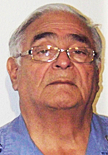Crowd hears fiery speeches by proponents of the 10-1 system for electing council members
Corrected Thursday, November 1, 2012 10:35am
The rain-delayed “Trust Austin” rally honoring civil rights leader Arthur DeWitty, originally scheduled for a week earlier, drew a Saturday audience that event organizers Austinites for Geographic Representation (AGR) estimated at 150-200 people to the Park Place Pavilion in East Austin.
It was the latest in a string of Proposition 3 campaign activities that included multiple in-house fundraisers and a garage sale, as well as numereous appearances at neighborhood association meetings. Funds raised so far have been used to print 100,000 door hangars, plus yard signs and fliers to be distributed by volunteers.
Representatives from numerous community organizations spoke in favor of the 10-1 plan, leaving no doubt of their passion for electing City Council members from geographic districts, instead of the all-at-large system that’s been in place since 1953.

Noting that some form of geographic representation had been on the ballot six times before and failed, retired State Senator Gonzalo Barrientos said, “Politicians put it on the ballot and then sat on their hands. We want geographic representation.”
Barrientos said Mayor Lee Leffingwell and Mayor Pro Tem Sheryl Cole asked him to sit on the 2012 Charter Revision Committee, which he chaired. “Hundreds of people said what they wanted, and we recommended the 10-1 plan” to the City Council. “Did they pay attention? No!
“The people have to speak and speak loudly,” Barrientos said.
The 10-1 plan was put on the ballot first by a City Council vote. But AGR nevertheless completed its petition drive and got it on the ballot that way, in the interest of calling it the “people’s plan” and not the “politicians’ plan”

University of Texas student John Lawler spoke on behalf of UT Democrats. While Austin likes to think of itself as “forward thinking” the City Council “does not mirror the city’s diversity and neighborhood groups,” he said, noting The Daily Texan had endorsed the 10-1 plan. (Corrected Thursday, November 1, 2012 10:35am. The Daily Texan endorsed Proposition 4—not Proposition 3. See comment #9 below.)
Although students might have the opportunity to elect a council member under the 10-1 plan, he said, “We’re not thinking of ourselves but the long-term impact of single-member districts.”

A brief summary of Arthur DeWitty’s contributions to the city were delivered by NAACP Austin President Nelson Linder. He said those contributions were “much bigger than his run for the City Council” in 1951. DeWitty organized black voters and spent his whole life educating people. And he challenged the idea that black people had never been elected in Austin, saying, “If we don’t have the opportunity to elect our own people we are not part of the system.”
“Now it’s 2012 and we’re having this same conversation” that another Austin civil rights leader, Volma Overton, led in 1984.
“I am not pacified and neither should you be. I want representation and so should you,” Linder said.
“Si, se puede,” (yes, it can be done) said Fred Cantu, chairman of the Austin Tejano Democrats.“The 10-1 plan makes more sense than 8-2-1,” he said. “It gives African Americans an opportunity district—8-2-1 does not. The 10-1 plan guarantees 2 Hispanic places—8-2-1 does not.”

Robin Rather, a longtime Austin environmental activist, said, “Of all the political speaking I’ve done, this one means the most to me.” Looking at the diversity among the people attending, she said, “I see what Austin looks like. This is an incredible coalition,” she said.
“The Austin environmental community is for the 10-1 plan.”

Attorney Roger Borgelt of the law firm Potts & Reilly LLP Borgelt Law, and vice chairman of the Travis County Republican Party, said, “We need this change because the people who control this town just don’t get it,” then, after pausing for the punch line, added, “and they’re worried about ward politics. I worry about the neighborhoods being able to elect their own representatives—not ward politics at City Hall. They should not be able to elect all the council members, but one council member.”

Marcelo Tafoya of the League of United Latin American Citizens, District 12, said “It will change Austin forever if we get this (Proposition 3) passed. Commit to take 10 people with you to vote and we can win this election—I guarantee it.”

Laura Pressley, PhD, a 2012 council candidate, said, “We cannot stand this corrupt, crony system any more. We can’t take tax increases any more. They raised utility rates. They represent big corporations and developers—not the people.”
Noting this campaign has a “shoestring budget,” Pressley said, “Volunteers can step up and be the glue to make this happen. … Put door hangars up, talk it up, do Facebook, and get this passed.”

Attorney Delia Garza, a former Austin firefighter who’s now an assistant attorney general, said in serving on the 2012 Charter Revision Committee she went in without preconceived ideas and became convinced to support the 10-1 plan. That plan was supported by the majority of citizens who addressed the Committee and it was recommended to the City Council by the Committee, yet the council put 8-2-1 on the ballot as well, she said.
“At the end of the day it’s about those four zip codes wanting to keep the power,” Garza said, “8-2-1 is the ‘gentlemen’s agreement 2.0’—it changes very little.”

Stewart Snider, president of the League of Women Voters Austin Area, said the organization studied the plans and was impressed with the Citizens Independent Redistricting Commission that’s part of the 10-1 plan. (The Commission will draw district boundaries the council will have no choice but to adopt.) He urged people to consider what the Texas Legislature’s gerrymandering has done to Travis County. “We don’t want that to happen in Austin, he said. “The only way is to have citizens do the redistricting. We are all for that.”

Attorney Steve Aleman, president of the Austin Neighborhoods Council, said, “We want our voices heard on the council.” He said we have a tremendous city and tremendous neighborhoods but it’s hard to represent all of the city. “We want representation that’s equal. Let’s share the talent from all of the city.”
The Austin Neighborhoods Council will be at Austin Energy, 721 Barton Springs Road, Wednesday 6-9pm so that volunteers can drop by and pick up yard signs and door hangars.

Attorney David Van Os, a former chairman of the Travis County Democratic Party who ran for the Texas Supreme Court in 1998 and 2004 and Texas Attorney General in 2006, made the final speech and he minced no words.
“There are two kinds of power: the good, clean power of the people and the democratic process of people owning their government,” Van Os said. “The other kind of power comes from self-serving politicians who want to maintain power at the expense of others.”
Of the infamous “gentlemen’s agreement” struck in the 1970s that assured a council seat for an African American and Latino by denying white candidates funds to run in those two places, Van Os said the minority members who win those seats “serve by permission of white Austin voters, and at the sufferance of white voters.”
The 8-2-1 plan, Proposition 4 on the November 6 ballot, “is just an effort to have another version of the gentlemen’s agreement,” he said.
“The soul of this city is on the line in this election,” Van Os said.
If the 10-1 plan wins, he said, “The change you will experience in dealing with your city government will be amazing. (The) 8-2-1 (plan) wants to keep that from happening. The at-large council members will cancel out the votes of single-member districts.”
“Let’s bring this city into the modern era,” Van Os said. “Let’s do it. The time is now.”
Correction: The original version of this story placed attorney Roger Borgelt at the wrong law firm, instead of Borgelt Law.
This report was made possible by contributions to The Austin Bulldog, which operates as a 501(c)(3) nonprofit to provide investigative reporting in the public interest. You can help to sustain The Austin Bulldog’s coverage by making a tax-deductible contribution.
Related Bulldog coverage: This is The Austin Bulldog’s 30th article covering issues and activities pertaining to proposed changes to the Austin City Charter.
Feisty Debate Over Electing Council Members: One panelist argues for no change to the at-large system of City Council elections, October 4, 2012
Proposition 3 and 4 Proponents Rev Their Campaigns: Raising money, organizing troops, and pushing plans for geographic representation on Austin City Council, September 28, 2012
Redistricting Need Not Be a Quintessentially Political Process: Independent redistricting commissions for U.S. states and cities, September 24, 2012
Barrientos Lampoons Prop 4 With a Fable: Other proponents of alternative plans for geographic representation push their points, September 14, 2012
Proposition 3 Advocates Falsely Accuse RECA: Group alleges ‘rumor’ of $100,000 pledge by Real Estate Council to defeat Proposition 3, but RECA says not so, September 12, 2012
No-Change Option Surfaces in Ballot Debate: Former Council Member Bob Binder opposes both options on the ballot for geographic representation, September 11, 2012
The Election Wars Have Begun: Interest in how council members elected running high, as face-off debates abound, September 9, 2012
8-2-1 Near Certain to Go on Ballot: City Council Votes on Second Reading to Put Competition Election Plan on Ballot, July 31, 2012
Hard Fought, Heartfelt Charter Decision: Charter Revision Committee Votes 8-7 to Back 10-1 Plan for Council Elections, February 3, 2012
New Restrictions Proposed for Lobbyist Fundraising: Lobbyists Can Only Give Candidates $25 But Can Collect Unlimited Contributions For Them, January 22, 2012
Committee Debates How to Elect Council: Charter Revision Committee Divided Over Pure Districts vs. Hybrid System, January 9, 2012
Thirteen Charter Changes and Counting: Charter Revision Committee’s Next Job: Tackle Plan for Geographic Representation, December 14, 2011
Council Confirms November 2012 Election Date for Charter Amendments: Resolution Ensures Citizens Initiative Won’t Force May 2012 Charter Election, November 3, 2011
Coalition Launching Petition Drive to Get on the Ballot for May 2012 Election, October 18, 2011
Broad Community Interest Focusing on How Mayor and Council Members Elected, October 4, 2011
Coalition Nearing Petition Launch for Grass-roots Council District Plan, August 24, 2011
Maps Prove Select Few Govern Austin: Forty Years of Election History Expose Extent of Disparity, August 4, 2011
Petition Launch Imminent to Force Election for Geographic Representation in City Elections, March 7, 2011







